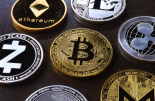Han Dieperink: Bitcoin 100.000
Han Dieperink: Bitcoin 100.000

This column was originally written in Dutch. This is an English translation.
By Han Dieperink, written in a personal capacity
Bitcoin has been an official part of the financial system since January this year. This development had been announced well in advance. In January it was a case of 'possession of the matter, end of fun', but now it has become clear that more and more investor money is flowing into Bitcoin.
For the time being, it is mainly American investors who invest in Bitcoin, partly because regulators here are less easy to convince. But the consequences for Bitcoin and other cryptocurrencies are clearly visible in the large inflows. Besides this one-off, bubble-forming event, there are certainly other reasons why investors are getting into Bitcoin: momentum-driven greed, as an alternative to gold, or as a kind of ultimate warrant on the Nasdaq. A price of Bitcoin 100,000 versus the dollar is in the offing.
Hot air
Of course, Bitcoin remains hot air and blockchain is still a solution in search of a problem. But the same also applies to physical gold or (literally) the trade in CO2 rights. The value of paper money is also based on trust. The difference between paper money and Bitcoin is that paper money is supported by an institutional framework ultimately backed by the state with a monopoly on violence. Having justice and obtaining justice are two completely different things in Bitcoin.
However, that does not mean that investors cannot benefit from these price weightings. There are two types of assets: scarce assets and assets that ensure that scarce assets become less scarce. Scarce goods include gold and Bitcoin. These scarce goods are not easy to value. Ultimately, they are worth what a fool would pay for them and are therefore highly dependent on the liquidity and policy of central banks.
Scarce goods
There are also goods that are used to make scarce goods less scarce. For years, alchemists have tried to turn lead into gold, but the 'philosopher's stone' has never been found. Products that ensure that scarce products are less scarce have a value that consists of the tangible cash flows that someone can generate with such a product.
It should immediately become clear from the many cryptocurrencies that the market has apparently responded to the presence of a scarce commodity. The result is normally that the price then falls. This applies throughout society. As long as efforts are made to make scarce goods less scarce, there will be persistent deflation. That is the status quo of the free market.
Inflation only occurs when there is a disruption in supply or demand. Central banks only influence the demand side through the variation in the money supply. At some point, central banks create more money than crazy people (such as during the corona pandemic) and prices go up.
Free float
Now there are many cryptocurrencies, but a large part is in steady hands. These are owners who almost never show themselves on the market. Some of the owners have also lost their original codes. As that group grows, Bitcoin could rise further. Ultimately, Bitcoin will end at an all-time high simply because the rest of the market no longer has the access codes. That will take some time.
The fact remains that the scale of the crypto markets is small compared to the major financial markets. If everyone puts just one percent of their portfolio into Bitcoin, the price of Bitcoin could rise sharply. Furthermore, on paper Bitcoin still meets the requirements for a hype: paradigm shift, promise of a distant future, broadening of the investment theme - especially with the recently introduced ETFs - and increasing liquidity. It just has to compete with artificial intelligence there.
Bitcoin 100.000
Last summer it became clear that Bitcoin would most likely become part of the financial system because several large (American) asset managers were going to introduce ETFs on Bitcoin. The price has now doubled, while the process of withdrawing Bitcoin has only just begun.
That inclusion also makes Bitcoin susceptible to the hype already happening in AI stocks. Since the AI hype can rise much further based on valuation levels, Bitcoin will benefit from this, judging by the strong correlation. On average, the Bitcoin leverage on Nasdaq was a factor of 3. Then Bitcoin 100,000 should be easily achievable.








